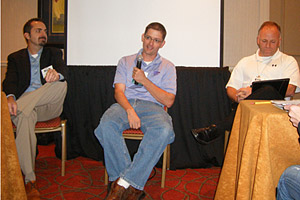
|
| During the National HVACR Technology and Business Systems Forum at ACCA’s Contracting Week in Nashville, Tenn., three contractors talked about their uses of technology in their respective businesses. The three panelists from left to right Rich Bodwell, Innovative Service Solutions of Orlando; Rob Benefiel, Certified Comfort Heating and Cooling of Louisville, Ky.; and Eric Knaak, Isaac Heating and Air Conditioning of Rochester, N.Y. |
NASHVILLE, Tenn. — Three contractors representing a spectrum of business styles and opinions on the use of technology spoke to a standing room only crowd of HVACR contractors during the Air Conditioning Contractors of America (ACCA) Contracting Week™. During the first leg of week-long events, roundtables, and forums, the new National HVACR Technology and Business Systems Forum attracted quite a bit of attention.
The three panelists were: Rob Benefiel, Certified Comfort Heating and Cooling of Louisville, Ky.; Rich Bodwell, Innovative Service Solutions of Orlando; and Eric Knaak, Isaac Heating and Air Conditioning of Rochester, N.Y.
In contrast, Benefiel’s company has three employees, Bodwell’s has 27, and Knaak’s employer has about 225.
In an effort to help the audience determine what works and what doesn’t work, the trio shared tips and tricks that had helped in the utilization of technology. Though, as is apt to happen with many panels consisting of successful contractors, the audience leaned toward routine day-to-day discussion of things such as service agreement management, but the group stayed fairly close to the subject matter.
Benefiel told the audience that his small company runs on as many inexpensive or free services as he can possibly find, as long as they are effective. Currently, his business operates with Gmail, Google Calendar, Google Maps, and Google Docs. For a small startup, even the purchase of a Windows software package can be somewhat daunting according to Benefiel, so he conservatively selects his tools.
Tech Pros + Cons
Bodwell said he uses GPS in his truck, “Even though we know the technicians will disable it if they want to.” However, the panel generally believes there are some great business reasons to use GPS that far outweigh the Big Brother problems that it can create. Truck idle time turned out to be a sizable fuel savings for Bodwell. He said, “Often a tech will leave a vehicle running, and our system pings him on his phone until he turns it off.”
Knaak noted the advantage of GPS at Isaac Heating and Air Conditioning was initially as a dispatch tool, and said, “But if you are using it to monitor your technicians, you really need to get new techs instead.”
Some of Knaak’s techs have iPads, which help with equipment lookup, checking emails, and being able to check the dispatch board. About five years ago the Isaac company stopped storing paperwork on customers. Now, the company scans all service tickets and stores them electronically. The company also uses social media such as Twitter and Facebook to aid with consumer marketing.
One automation feature that Knaak said his company is trying to get away from is an automated phone answering service. “Oddly, if you call us at 2 a.m., you get in touch with a real person, but at 10 a.m. you get an auto attendant,” said Knaak.
A question from the audience about using email with customers evoked this response from Benefiel: “We found a study that reported only 29 percent of customers reply on social media regarding negative situations.” Bodwell thought this perhaps was an indication that many more people could be unsatisfied with your company’s performance, but even more importantly, that if you do not have a blogging type of presence in social media, you should get one. The speed at which a company reacts to negative comments can make a huge difference in overall success in the social media community.
Bodwell suggested that making a change to a new software program can be quite a process. “Converting from one software system to another was a four year plan for us. We have been going toward a paperless company for quite a while, but some things are still paperbound,” said Bodwell.
All concurred that a paperless business would be helped along if all manufacturers would open up their websites to make it easier for all contractors to access online installation manuals and other technical information.
Publication date: 12/12/2011



Report Abusive Comment